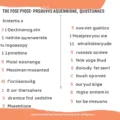The Science Behind Gratitude
Research has shown that practicing gratitude can have profound benefits on both mental and physical health. Studies have linked gratitude to improved sleep quality, reduced symptoms of depression and anxiety, increased happiness and life satisfaction, and better relationships.
Boosts Mood and Fights Depression
Gratitude has been shown in multiple studies to elevate mood. Both gratitude reflection and gratitude journaling have been found to decrease symptoms of depression and anxiety. This is likely related to gratitude’s ability to refocus attention on the positive, which can interrupt cycles of negative thoughts.
Strengthens Relationships
Feeling and expressing gratitude for the people in our lives encourages us to appreciate them more. This builds stronger bonds, increasing relationship satisfaction and intimacy. It also makes people more likely to help those they feel grateful towards.
Improves Physical Health
Gratitude practices like reflecting before sleep have been found to improve sleep quality and duration. Better sleep alone can enhance immune function, reduce pain sensitivity, lower blood pressure, and decrease inflammation. Some studies have also linked gratitude directly to better heart health, reduced headaches, healthier eating, and increased likelihood of exercise.
5 Simple Ways to Cultivate Gratitude
- Keep a gratitude journal where you write down a few things you’re grateful for each day.
- Take time to reflect on what went well before going to bed each night.
- Tell a friend or family member why you’re grateful to have them in your life.
- Write thank you notes expressing appreciation for kind deeds.
- Give back by volunteering for an organization whose work you’re grateful for.
Frequently Asked Questions
What are some benefits of practicing gratitude?
Research shows gratitude is linked to improved mood, lower depression and anxiety, better sleep quality, enhanced relationships, increased happiness and life satisfaction, healthier habits, and even better heart health.
How do you practice gratitude in your daily life?
There are simple ways to cultivate gratitude each day: keep a gratitude journal where you jot down things you’re grateful for, take time to appreciate positive moments before bed, tell loved ones why you appreciate them, write thank you notes to people who help you, and give back through volunteering.
Does gratitude really help with depression and anxiety?
Yes. Multiple research studies have found gratitude practices like journaling and grateful reflection to significantly reduce symptoms of depression and anxiety. Focusing on blessings counteracts negative thought patterns.
When is the best time to practice gratitude?
Gratitude can be beneficial at any time of day. However, taking a few minutes at night to write in a gratitude journal or reflect on positive moments from the day helps end on an uplifting note and has been shown to aid sleep.
How long before you notice the benefits of gratitude?
It may only take a couple weeks of daily gratitude practice to start noticing positive changes like improved mood, outlook, and sleep quality. But the more regularly you cultivate gratitude, the greater and more long-lasting the benefits.









